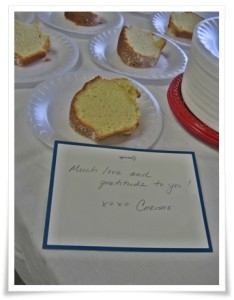 Nice luncheon!
Nice luncheon!
The TBI Guys came down and yessireeeeeeee MARINE Moms! They got hugs from all of you!!! ARMY Moms, they were from you, too!
Love the staff from their floor, they take great care of their patients, very caring and very protective.
So are the combat nurses, Corpsmen and medics on the combat wing.
We also served combat patients and their families, and some active duty patients who weren’t combat wounded, at Walter Reed for other medical reasons.
One of patients came in and had a German accent, spouse of a Veteran. Imagine our surprise when Suzan started speaking German to her! That was pretty cool…
We were reminded of HIPAA when one of the nurses came in and asked if we were taking names, someone had seen us writing something down.
I told her no, we were just making marks for each of the people we served and showed her the paper.
Keeping track of who we serve helps us plan for the next luncheon. It also helps us budget our money knowing how much it costs per person to serve the luncheons.
Julie had made up snack bags and we had quilts and assorted varieties of Chef Boyardee on the niftie-giftie table to give out.
Roster: Dina, Jane, and Suzan, with help from Julie, Barb & Don, and Christie
Thank You All! Job Well Done!
Menu:
Deviled eggs
cheese and pepperoni tray
BBQ pulled pork
turkey & cheese wraps
chicken noodle soup
fresh fruit salad
mac & cheese
cole slaw
green beans
assorted cookies
pound cake and apple pie
asst drinks
and smoothies.
 Deep Gratitude to those of you who support the luncheons. They are very much appreciated by the patients and families, more than you know…
Deep Gratitude to those of you who support the luncheons. They are very much appreciated by the patients and families, more than you know…
There are times when the only food some of the patients have had in months is institutional food.
Other times a patient’s appetite isn’t good, nothing sounds or looks good to him or her, one of the family members goes back to their room with a plate of food and a few minutes later, they’re back in the luncheon room to get something for their loved one. And sometimes, they come back a few more times… we never know what’s going to hit the spot for someone. Today it was the deviled eggs.
March is National Brain Injury Awareness Month.
Troops are, and have been, coming home from war with mild to severe Traumatic Brain Injuries (TBI). We’ve met severely injured TBI patients at Walter Reed.
Their injuries have happened during training accidents, in post-deployment leave accidents, or when they stepped on an IED, or their vehicle was blown up by an IED, or a blast from an IED 100 yards away affected them, or shrapnel hit them, or when they were shot in the head.
There are two different kinds of traumatic brain injuries
- penetrating brain injuries – caused by a bullet or shrapnel. With this kind of TBI scars are often apparent.
- closed brain injuries – the brain gets rattled around inside the skull from an explosion. These wounds are “unseen”, no scars.
Walter Reed/Bethesda provides state of the art treatment for traumatic brain injuries through their Traumatic Brain Injury Service / Defense and Veterans Brain Injury Center (DVBIC).
BrainLineMilitary has extensive information about Traumatic Brain Injury. Their website states:
In the military from 2000 through 2012, more than 266,000 service members sustained a TBI. Brain injury has become known as the signature wound of the wars in Iraq and Afghanistan. Most brain injuries are mild, and most people recover in a matter of weeks. BrainLineMilitary.org provides military-specific information and resources on traumatic brain injury to veterans; service members in the Army, Navy, Air Force, Marines, National Guard, and Reserve; and their families.
Many of these service members have young children. Our Daddy Is Invincible! written by Shannon Maxwell, whose husband was injured in 2004 in Iraq, is an excellent book written for children about TBI.
Take the time to learn about the symptoms of Traumatic Brain Injury. That “forgetfulness” or “dizzy spell” you, your loved one, your co-worker, or your employee has may be a symptom. As service members transition out of the military into civilian life we may be seeing more of these injuries in our communities.
If we, civilians, understand the causes, symptoms, and coping skills for Veterans with TBIs, it will help make their transition easier, won’t it?
Until next time, continued prayers for our military and their families.
Love and Hugs,

